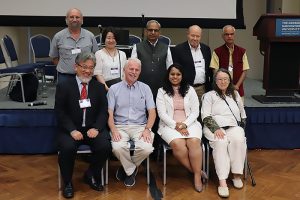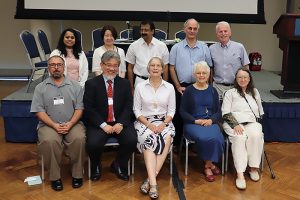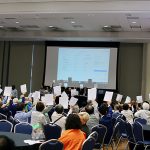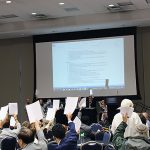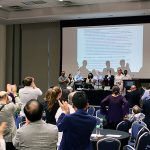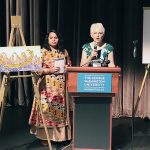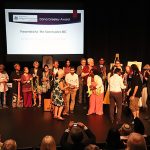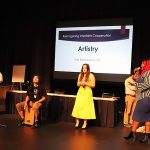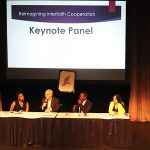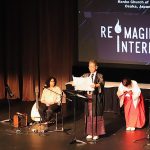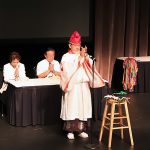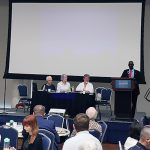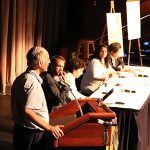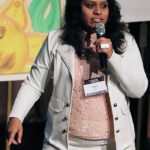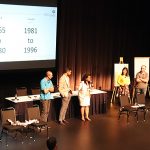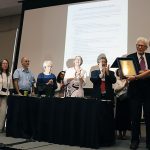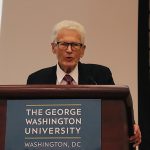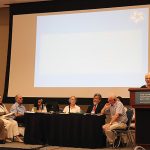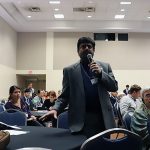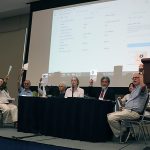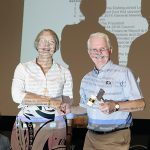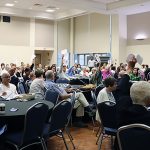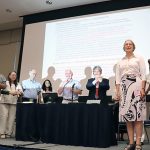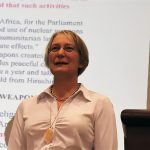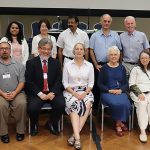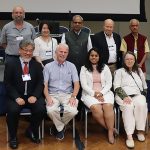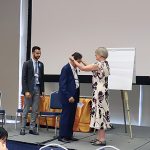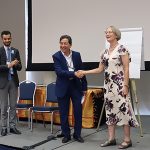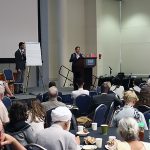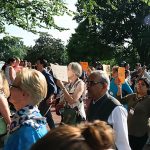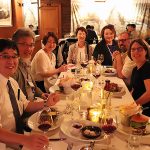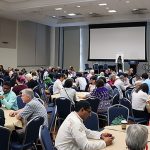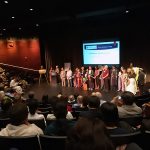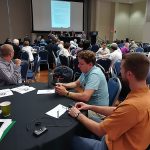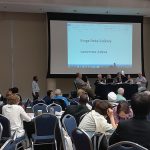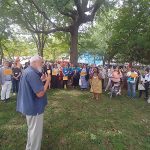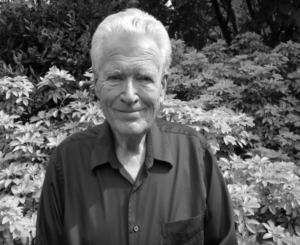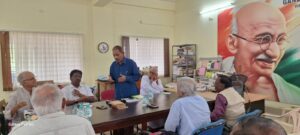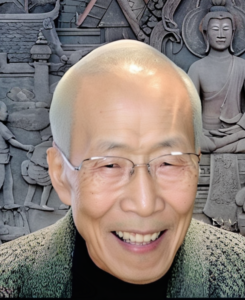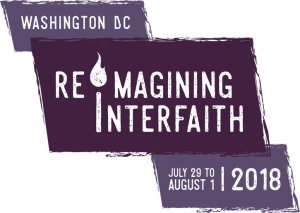
Our 35th Congress, held on 29 July – 1 August at George Washington University in Washington DC (USA), was something we hadn’t tried before. Namely, we chose the format of a collaboration project and were able to gather many wonderful, diverse partners with the support of the host, our member group, the Unitarian Universalist Association.
The Reimagine Interfaith Conference, like every Congress before, incorporated fellowship, learning, sharing, the General Meeting, Chapter and regional meetings, worship and many other wonderful experiences. This time we were honoured to share them with various friends from our partner organizations, which enriched the event in many different ways and allowed everyone to benefit from the enormous networking and skill-building opportunities.
Reimagine Interfaith was organized at our initiative and co-sponsored by such renowned organizations as Religions for Peace USA, United Religions Initiatives USA, United Church of Christ, the Hindu Temple Society of North America, GW Interfaith, Interfaith Youth Core, Fezana and Shoulder to Shoulder, as well as multiple religious communities.
Moving forward
The General Meeting, attended by over a hundred delegates from all over the world, reviewed the performance of the organization and took a number of important decisions that will guide our work in the upcoming four years. Pursuing efficiency and even greater transparency, the association, currently incorporated as a Charitable Company under UK law, will transform into an Incorporated Charity Organisation, a new form of legal personality designed to simplify the way charities operate and help them focus more on their statutory goals by eliminating a number of cumbersome administrative obligations. This will provide an opportunity to redraft our constitution guided by the experience we have gained since the current document was adopted. The process has already began, launched by the outgoing Council, and will lead to calling an extraordinary General Meeting to approve the new constitution as soon as possible. The delegates approved of the work of the outgoing Council, presided by the Rev. Wytske Dijkstra, and elected a new International Council for a four-year term. The following persons were elected:
| MEMBER GROUP or CHAPTER | COUNTRY | IARF Region | |
|---|---|---|---|
| President — Robert Ince | The General Assembly of Unitarian and Free Christian Churches | United Kingdom | Europe & Middle East |
| Vice-President — Janhvi Gupte | RFYN (Young Adult Network) | India | non-regional |
| Treasurer — Rev. Yoshinobu Miyake | JLC (Japan Lianson Committee) | Japan | East Asia |
| Rev. Esther Suter | IALRW | Switzlerland | non-regional |
| Rev. David Keyes | Unitarian Universalist Association | USA | North America |
| Dr. Surrendra Brown: | India Chapter | India | South Asia |
| Prof. Prakash Rao | India Chapter | India | South Asia |
| Rev. Kimie Yanagida | JLC (Japan Lianson Committee) | Japan | East Asia |
| Rabbi Bob Carroll | Interfaith Encounter Association | Israel | Europe & Middle East |
| Rev. Kinga Reka Szekely | Open Seat | Romania | non-regional |
We are happy to have been able to celebrate the achievements of two prominent interfaith activists and support the work of an accomplished and unique interfaith project run by young adults.
The Schweitzer Award
The Franco-German theologian, organist, philosopher, physician, and Nobel Peace Prize winner Albert Schweitzer was a member of our organisation – perhaps the best-known of all. Schweitzer’s passionate quest was to discover a universal ethical philosophy, anchored in a universal reality, and make it directly available to all of humanity. The keynote of Schweitzer’s personal philosophy was the idea of Reverence for Life. Since 1975, we have honoured his contribution by creating the “IARF Albert Schweitzer Award for Distinguished Service to the Cause of Liberal Religion“. The Award is presented at each IARF Congress, currently held at 4-year intervals. Recent recipients include the Dalai Lama and Karen Armstrong.
This year the award went to Sheikh Khaled Bentounès, the Sufi master of the Shadhiliyah-Darquawiya-Alawiya Sufi Tariqat based in France. The Sheikh is the founder and president of AISA (International Sufi Association Alawiyya), a UN-accredited organisation promoting peace efforts, interfaith dialogue and reconciliation, as well as women’s rights. In 2014 AISA launched a global campaign for the UN to establish the “International Day of Living Together in Peace” on 16 May. A petition to the UN was Created by Sheikh Bentounès “to demonstrate to the political authorities our desire for peace”, to which IARF has committed itself in 2015.
The Sheikh is an outspoken and charismatic advocate of freedom, human rights and border-defying relationships based on spirituality and humanism. A remarkable character and a highly charismatic religious leader in his own right, he is a key figure in an international network for promoting interreligious harmony and peace. His views on religion are inclusive and universal. He is equally apt to be at the centre of mystic gatherings as to lead large interfaith manifestations.
By: Mazaré, the Sanctuaries
For Reimagining Interfaith
extraordinary.
you’re here
you’re finally here.
i’ve heard so much about you
the glowing ones
i’ve seen snapshots of your eyes
not just open,
sho ‘nuf awake
like history books
written by the underdogs
eyes not just enlightened,
ablaze.
like a candle turned blow torch
you now see the jewels you have
that others lack
and you see the jewels
being ripped from others’ chests,
feet stepping on necks
backbones yanked out of place
so that upstanding citizens
can’t stand up straight
this enrages you
they say you shouted
at a pack of lions once.
they were circling this gazelle
who was wearing a hijab
wearing a cross
wearing a red dot
they were clawing at her
sneering, poking, prodding
prepping
to pounce
The Greeley Award
In the early seventies, Rev. Dana McLean Greeley served IARF as its president. A prominent Universalist leader throughout his career, he introduced a number of innovations to IARF and widened its scope by introducing several Japanese groups from Shinto and Buddhist traditions as members. The primary goals of the award are to support organizations of young adults, and the communities within which they are engaged, to conduct programs of leadership development, human rights education, and engagement in understanding one another’s beliefs within the context of commitment to religious freedom.
The Award, in the form of a monetary grant, is presented at each IARF Congress to a group of young adults in recognition of their contribution to interfaith work. This year the award went to The Sanctuaries: Interfaith Arts Education. This is how The Sanctuaries explains its mission.
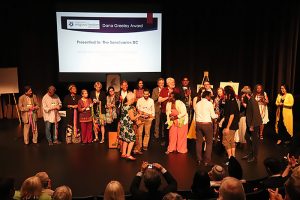 The Sanctuaries is the first interfaith arts community in the United States. We use the arts to transform two of the most divisive global issues of our time – race and religion – into forces for personal growth and social change. We fulfil this mission in two ways. First, through our multicultural community of over 150 artists, we deepen interfaith understanding by hosting regular events, retreats, and multimedia arts showcases. Second, through our Art for Social Impact training program, we educate interfaith artists how to be leaders in their local communities. Participants in this highly selective program gain first-hand experience working on the front lines of grass-roots justice campaigns to address the systems that keep us divided in the first place.
The Sanctuaries is the first interfaith arts community in the United States. We use the arts to transform two of the most divisive global issues of our time – race and religion – into forces for personal growth and social change. We fulfil this mission in two ways. First, through our multicultural community of over 150 artists, we deepen interfaith understanding by hosting regular events, retreats, and multimedia arts showcases. Second, through our Art for Social Impact training program, we educate interfaith artists how to be leaders in their local communities. Participants in this highly selective program gain first-hand experience working on the front lines of grass-roots justice campaigns to address the systems that keep us divided in the first place.
The Distinguished Leadership Award
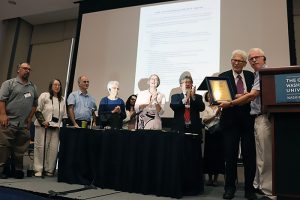 The IARF award for Distinguished Leadership in International Liberal Religion, established in 1980, is presented to prominent IARF activists who contributed most to the shape of the organisation and the pursuit of its goals. Former recipients include Shinichiro Imaoka (1981), Dana McLean Greeley (1984) and Diether Gehrmann (1990).
The IARF award for Distinguished Leadership in International Liberal Religion, established in 1980, is presented to prominent IARF activists who contributed most to the shape of the organisation and the pursuit of its goals. Former recipients include Shinichiro Imaoka (1981), Dana McLean Greeley (1984) and Diether Gehrmann (1990).
The commemorative plaque and certificate will be presented to Rev. Richard Boeke. Throughout several decades of his involvement in IARF Rev. Boeke has been active on both the international and national (Chapter) level, in England and the United States, working to promote peace and understanding between religions and cultures. His work and writings speak of the urgency of religious and cultural dialogue, especially among groups that appear radically disparate. He is unceasingly working to facilitate dialogue with well-regarded leaders, activists, and scholars of many faiths, as well as at the grassroots level.
Accounts from the Congress
It was pleasant time to interfaith meeting which I learnt and shared a lot across the world. The receptions were welcoming, both of the conference and dormitory. Accommodation, food and refreshments all were exquisite. Programs, presenters, spiritual focus and group meetings we fanatic. Speeches were charming across the board, from the president to all the council who spoken. The elections were conducted fairly and new council were welcoming and ready to work.
A selection of the most important things I have gained and experienced:
– I celebrated other faith belief without losing mine.
– Partner with others who do not look like me.
– Plant the seed of my faith to other faith groups
– My faith was not compromised directly
In conclusion, the Reimagining Interfaith Conference brought interfaith communities into better alignment with social equity and social justice that are concern without any community faith being converted. Internationally, we got to know people and learnt to break barriers internally and externally from all the interfaith fraternity. Generally, Reimaging Interfaith Conference was international condition building across the identity.
This Reimagining Interfaith/IARF 35th World Congress was a new experience for me. Therefore, I was very nervous if they would accept me, as I do not have a religion. Although I have participated in many meetings and conferences before, they were never ones focused on religion, so negative things crossed through my mind. However, I was told that Japan has customs that make religion feel familiar even if someone does not have experience with a particular religion. I thought I understood that but I realized I actually didn’t. That is probably because I hadn’t faced religion and also hadn’t felt how important having a religion is, but I experienced the importance of having a religion and the inner warmth of human through this RI/IARF conference.
In this program, there were several opportunities to discuss in a group named “circle group”. Most of them were meeting for the first time and English, which is not my first language because I’m from Japan, made me concerned with how I should behave and if they would accept me. Especially since I am not a native English speaker, my fears of being misunderstood when speaking English always cross my mind. Although it is a linguistic problem, it is internalized and appear as features of ourselves. The linguistic issue weakens myself and it comes to the forefront. Those things made me even more nervous in the circle group.
Furthermore, speaking with a lot of strangers made me even more concerned with how I should behave and if I really could explain the way I feel ; hence, I decided to not expose myself much. Also, because the theme was religion, I found it hard to be open-minded as I do not belong to any religion and do not have knowledge about it.
In the circle group, I was just listening to the others and didn’t give any opinion. Because of this, the others in the group probably thought I was a cranky person even though I thought I was being cheerful as I ordinarily am, which I believed to relieve myself. However, I gradually realized that was wrong. I alienated myself by keeping my emotions in check. Because of this, when they said to me “Eri, would you like to talk about yourself?” , I kept refusing it but gradually, I realized how I was alienating myself. Eventually I cried as I realized my true nature, but the members of circle group listened to me carefully and accepted me the way I am. They told me about their views of religion and told me “ It’s okay, no worries” when I talked to them about why I was anxious. I think that warmth and kindness connect people beyond any religion. It is certainly an important part of religion to build their personality. I experienced the view of religions and learned to help and support each other.
Until now, I have not belonged to a religion and had an inferiority complex when I was among people with religion. Even though I do not have a religion, I believe in a god or buddha somewhere in my mind, and now I know everyone accepted who I am, which made me more confident. Furthermore, I thought I perhaps have a hybrid view of religion. Because I do not have religion, I strongly wanted to change my views of religion so that I could build
various teachings of my own.
I do not belong to a religion, but it reflects on myself or my views of religion by
learning various religions. I hope that I would like to continue learning to express myself with confidence in the future.
